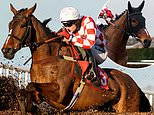Eclair Surf dies after sustaining traumatic head injury in yesterday’s Grand National
‘There’s no such thing as a “harmless flutter”‘: PETA slams Grand National after Eclair Surf becomes the FOURTH horse to die at the Festival after sustaining a traumatic head injury yesterday… following on from Discorama, Solwara One and Elle Est Belle
Eclair Surf fell at the third fence during yesterday’s Grand National at Aintree The eight-year-old was treated at Liverpool University’s equine hospital but despite treatment all night they were unable to save him He becomes the fourth horse to die at this year’s Grand National Festival, following on from Solwara One, Elle Est Belle and Discorama PETA slammed the Grand National and those who bet on it, saying there is ‘no such thing as a “harmless flutter”‘
<!–
<!–
<!–
<!–
(function (src, d, tag){
var s = d.createElement(tag), prev = d.getElementsByTagName(tag)[0];
s.src = src;
prev.parentNode.insertBefore(s, prev);
}(“https://www.dailymail.co.uk/static/gunther/1.17.0/async_bundle- -.js”, document, “script”));
<!–
DM.loadCSS(“https://www.dailymail.co.uk/static/gunther/gunther-2159/video_bundle- -.css”);
<!–
A second horse died on Sunday as a result of an injury picked up in the Grand National.
Emma Lavelle-trained Eclair Surf sustained a head injury after falling at the third fence and had to be put down after his condition deteriorated at the Leahurst Equine Hospital.
Lavelle said: ‘We were optimistic when he left the track but during the night as he got more distressed it wasn’t right to keep going.’
Eclair Surf (pictured at Sandown in February 2021) has died after sustaining a traumatic head injury in yesterday’s Grand National
Discorama was also put down after vets diagnosed an inoperable pelvic injury sustained while galloping on the flat.
It is the first time two horses have died as a result of injuries in the race since 2012 after which a number of changes to the fences were implemented.
Elisa Allen, director of PETA (People for the Ethical Treatment of Animals) said: ‘Eclair Surf’s death was predictable and avoidable, and it’s proof that the Grand National must be put out to pasture.’
But James Given, director of equine health and welfare for the BHA, said: ‘Welfare and safety is an ever-evolving commitment and the BHA works constantly alongside our racecourses to further improve the sport’s safety record and reduce avoidable risk.’
The eight-year-old (pic in December 2020) fell at the third fence being ridden by jockey Tom Bellamy
Eclair Surf won four times from 13 starts and won the Classic Chase at Warwick in January.
Eclair Surf fell at the third fence being ridden by jockey Tom Bellamy and was transferred to Liverpool University’s equine hospital after initial treatment at Aintree racecourse.
His death is the fourth at this year’s Grand National Festival, following on from Solwara One, Elle Est Belle and Discorama.
After Discorama’s passing following the showcase race on Saturday, PETA stated on their website: ‘At 4.5 miles, the headline Grand National race is one of the longest and most hazardous in the world – the high risk factor is what makes it famous.
After Discorama’s (pictured) passing on Saturday, PETA spoke out against the Grand National
‘Almost every year, horses are killed during the three-day festival, sustaining horrific and often fatal injuries at notorious fences such as the Chair, Becher’s Brook, and the Canal Turn.
‘Every time horses are forced to jump over these excessively high obstacles, it puts tremendous pressure on their slender front legs and they risk broken legs, necks, and backs.
‘In some cases, drugs – both legal and illegal – have been administered by trainers and even veterinarians to mask the pain of horses who should have been recuperating so that they could instead be forced to run with injuries, making them worse.’
Changes introduced in the last 10 years include adapting and rebuilding the fences, facilities and stables, with the The Jockey Club’s website stating: ‘From the very moment a horse arrives at Aintree the most important thing to the racecourse is its safety and welfare.’
![]()


